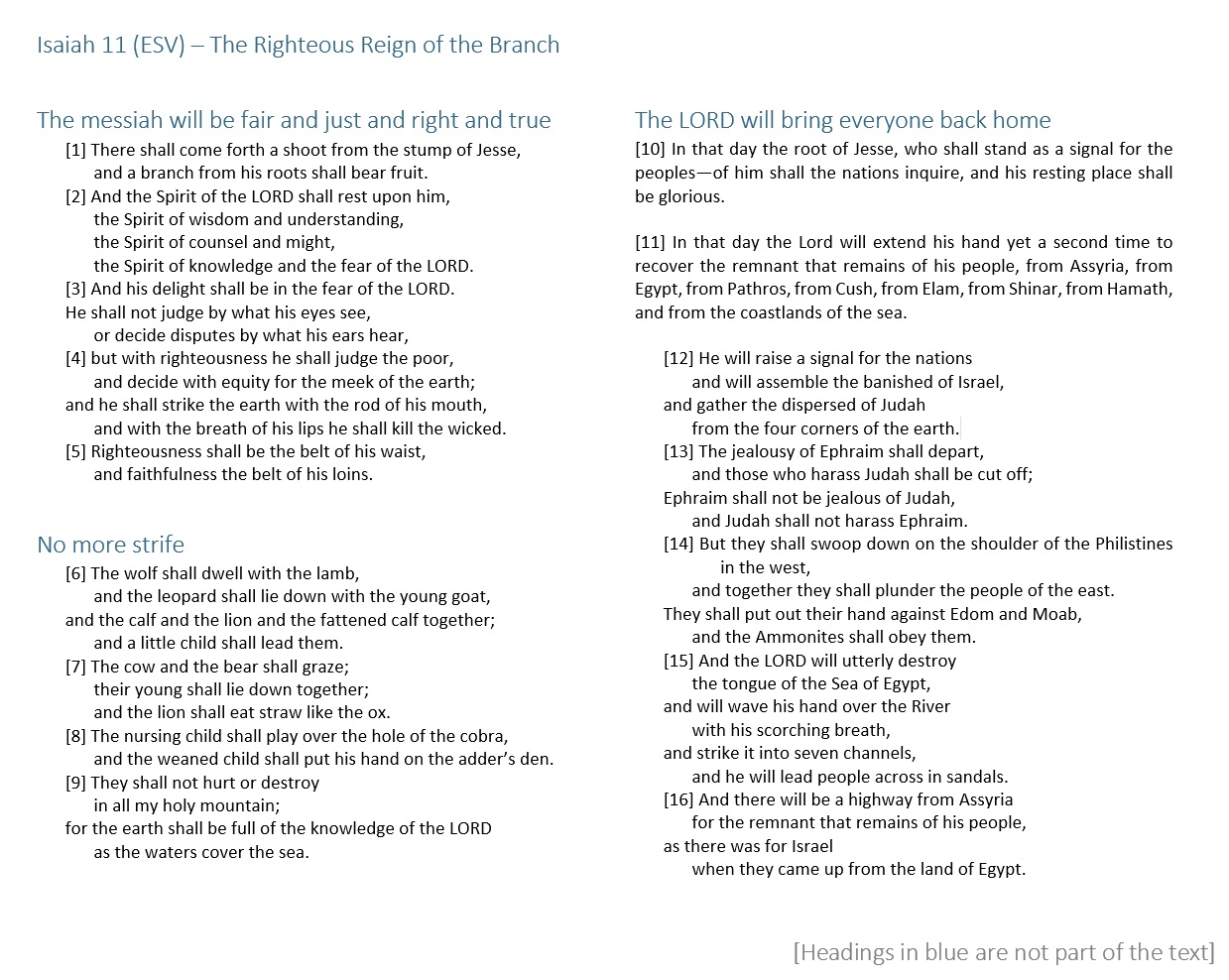In short
Jesse is the father of David, but this is written centuries after their deaths. This is a prophecy of the messiah who will be a descendant of Jesse, and, by implication, will be like David. (Spoiler alert: it’s Jesus.)
Why it is important
It gives a ton of hope for those living through all of those bad kings – a time when hope has very nearly been extinguished completely. (Isaiah preached “in the days of Uzziah, Jotham, Ahaz, and Hezekiah, kings of Judah” [Is 1:1].)
What is in this poem
Three really distinct sections as shown in the picture:
SECTION I: The messiah will be good and make things right (vs. 1-5)
- In verse 1, the poem illustrates a tree stump, symbolizing a family of descendants that was nearly destroyed. From it, a sprout emerges against the odds. This introduces the “remnant” concept that is the focus of the last section of the poem.
- Verses 2-5 describe the messiah’s irrefutable goodness
SECTION II: No more strife (vs. 6-9)
- The animals section!
- The animals are grouped in each stanza as a wild animal with a generally harmless one (or two), and yet they don’t destroy each other – even small children are safe
- I’ll discuss the meaning at the end of the lesson
SECTION III: The LORD will bring everyone back home (vs. 10-16)
- Who is scattered? Everyone, eventually in some way.
- The heathen nations are separated from the Jews
- Israel and Judah would soon leave their lands to go into exile (Israel may have already)
- But thanks to the messiah, they will all reunite
- Notice the returning people are called the “remnant” in vs. 10 and 16.

Theology and doctrine
What is the deal with the animals in verses 6-9? As I said earlier, the relationships are what we would see as literally unnatural, yet they are at peace. The section before this is messianic, as is the next section, so it implies that it is the messiah that is the cause of the peace.
Having said all that, is it saying that we can hug a cobra now, or even when Christ returns?
Of course, there is no shortage of people to take this all literally, but I would be very cautious, even skeptical of that. Verse 9 itself is so contradictory that it would almost have to be figurative. How can this happen on a mountain and fill the whole earth at the same time?
I think the safest understanding of this is that in the kingdom of the messiah (that is, the church), people who used to be enemies can now love one another, and the reason is Jesus Christ. And if it is also literal, well, that’s great, too. But I wouldn’t put too much stock in that. Also, consider Ezekiel 34:25-31, where wild animals are banished to keep the people safe.
“But now in Christ Jesus you who once were far off have been brought near by the blood of Christ. For he himself is our peace, who has made us both one and has broken down in his flesh the dividing wall of hostility by abolishing the law of commandments expressed in ordinances, that he might create in himself one new man in place of the two, so making peace, and might reconcile us both to God in one body through the cross, thereby killing the hostility. And he came and preached peace to you who were far off and peace to those who were near.”
Ephesians 2:13-17

No responses yet